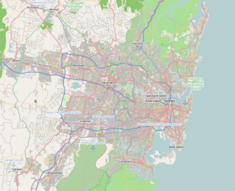Parramatta River railway bridge, Meadowbank
| Parramatta River railway bridge, Meadowbank | |
|---|---|
 Meadowbank Railway Bridge in 2014 with the John Whitton Bridge behind it | |
| Location | Main Northern railway line, Meadowbank and Rhodes, Sydney, Australia |
| Coordinates | 33°49′19″S 151°05′20″E / 33.8220°S 151.0888°E |
| Built | 1886 |
| Built for | New South Wales Government Railways |
| Architect | John Whitton |
| Owner | Transport Asset Holding Entity |
| Official name | Meadowbank Rail Bridge over Parramatta River; John Whitton Bridge; Meadowbank Rhodes Railway Bridge |
| Type | State heritage (built) |
| Designated | 2 April 1999 |
| Reference no. | 1189 |
| Type | Railway Bridge/ Viaduct |
| Category | Transport – Rail |
The Meadowbank Railway Bridge is a heritage-listed former railway bridge and now cycleway which carried the Main Northern line across the Parramatta River between the suburbs of Meadowbank and Rhodes in Sydney, New South Wales, Australia. It was designed by John Whitton and built in 1886. The bridge is also known as the Meadowbank Rail Bridge over Parramatta River, erroneously the John Whitton Bridge and the Meadowbank–Rhodes Railway Bridge. It is owned by the Transport Asset Holding Entity.
History
[edit]The bridge was built in 1886.[1]
In 1980, a new parallel bridge, the John Whitton Bridge, was built to carry the train line and the historic bridge was taken out of use.[2] After twenty years of disuse, it was converted to a pedestrian bridge and cycleway in the lead-up to the 2000 Summer Olympics.[3]
In 2016, the local mayor and state opposition expressed concern about the deteriorating state of the bridge and called upon the state government to fund repairs and confirm their future plans for the bridge.[3]
Heritage listing
[edit]The bridge is one of twelve double lattice girder bridges that survive substantially intact in the NSW railway system. As such it is of exceptional heritage significance as evidence of a short lived but highly popular approach to bridge design in which the spanning girders were reinforced by a lattice of bars, adjusted to suit changing structural forces. This bridge is the largest double track lattice girder bridge to be prefabricated in England for export to Australia and has significant variations on the standardised design. The bridge is one of the most architecturally impressive nineteenth century Australian railway structures. A unity in design, lively detail, skilful use of materials and fine workmanship is displayed by the bridge and its abutments. The Meadowbank-Rhodes bridge is an exceptional piece of early Australian railway engineering.[4][1]
It was listed on the New South Wales State Heritage Register on 2 April 1999.[1]
Engineering heritage award
[edit]The bridge received a Historic Engineering Marker from Engineers Australia as part of its Engineering Heritage Recognition Program.[5]
See also
[edit]References
[edit]- ^ a b c "Meadowbank Rail Bridge over Parramatta River". New South Wales State Heritage Register. Department of Planning & Environment. H01189. Retrieved 2 June 2018.
 Text is licensed by State of New South Wales (Department of Planning and Environment) under CC BY 4.0 licence.
Text is licensed by State of New South Wales (Department of Planning and Environment) under CC BY 4.0 licence.
- ^ "Meadowbank Railway Bridge - Trail Description". railtrails.org.au. Retrieved 27 June 2018.
- ^ a b "Labor pile on pressure to repair the heritage listed Meadowbank Bridge". Northern District Times. 6 December 2016. Retrieved 27 June 2018.
- ^ Sinclair Knight Merz, 1996
- ^ "Meadowbank Railway Bridge, Parramatta River, 1886-". Engineers Australia. Retrieved 3 May 2020.
Bibliography
[edit]- "Meadowbank rail bridges over Parramatta River". 2007.
- Attraction Homepage (2007). "Meadowbank rail bridges over Parramatta River".
Attribution
[edit]![]() This Wikipedia article was originally based on Meadowbank Rail Bridge over Parramatta River, entry number 01189 in the New South Wales State Heritage Register published by the State of New South Wales (Department of Planning and Environment) 2018 under CC-BY 4.0 licence, accessed on 2 June 2018.
This Wikipedia article was originally based on Meadowbank Rail Bridge over Parramatta River, entry number 01189 in the New South Wales State Heritage Register published by the State of New South Wales (Department of Planning and Environment) 2018 under CC-BY 4.0 licence, accessed on 2 June 2018.
External links
[edit]![]() Media related to John Whitton Bridge at Wikimedia Commons
Media related to John Whitton Bridge at Wikimedia Commons

